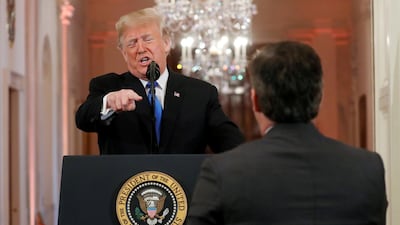A German journalist friend was cycling to work when he heard someone call out his name. He stopped and smiled at a pedestrian who clearly recognised him from his TV appearances but then the man pointed accusingly and yelled out: “Lugenpresse”. My German friend was shocked, not so much by the abuse as by its roots. The word means “lying press” in English, and was used by the Nazis to intimidate journalists in the 1930s.
In Britain, media outlets, most notably the BBC, are constantly criticised on all sides for supposed bias. This month, the BBC was attacked for a lengthy interview with the multimillionaire Arron Banks, who gave millions of pounds to the Brexit campaign. Because Mr Banks is now the target of a National Crime Agency investigation into where he got his money, critics argued he should not be “allowed” on television.
Such controversies go right to the very top. In the US, president Donald Trump routinely attacks journalists as the “enemy of the people” – another phrase much-loved by the Nazis. Mr Trump’s attempts at revenge for media criticism include, in the past few days alone, withdrawing the White House press pass of CNN’s dogged correspondent Jim Acosta and attacking reporters he simply doesn’t like for asking what he terms “stupid” questions and producing “fake news”. In August this year, more than 300 US newspapers banded together to denounce Mr Trump’s inflammatory language and his attacks on journalists. Since then, matters have deteriorated further.
Journalists complaining about how hard it is to do their jobs are a bit like sailors complaining about the sea. You just have to get on with it. But sometimes the verbal attacks and controversies extend even further. The US-based Committee to Protect Journalists says 45 have already been killed worldwide this year and at least 81 were killed last year, sometimes deliberately targeted and murdered.
But beyond physical threats and bullying by people in power, there is another concern that affects not just journalists but every one of us who reads newspapers or tunes in to TV and radio news. What information sources can you trust? In the past week, I’ve attended two conferences on trust – or rather, the lack of it – and they have been both provocative and depressing.
Depressing because in Britain, the BBC and quality newspapers like The Times and The Guardian continue to be trusted for the information they provide but trust in all media outlets has declined over the past 20 years. Some tabloid newspapers are not trusted at all – although there has been little change there. They have never truly been trusted.
Meanwhile, beyond what is often referred to as the mainstream media, platforms such as Twitter, Facebook, blogs, podcasts and information websites also have profound trust problems. Sometimes it is as a result of targeted, propagandist advertising or highly partisan supposed “news” that favours a political party or fringe political idea. But on the plus side, the internet is also the home of some of the most effective campaigning journalism anywhere. In Britain, a non-partisan organisation called Open Democracy consistently breaks high-quality stories that are then followed up by more mainstream news outlets.
_______________
Read more:
Iranian operatives sow discord on Facebook posing as anti-Trump activists
Fake news: can AI beat the epidemic?
Truth decay matters – whatever Rudy Giuiliani says
_______________
Nevertheless, the trust question persists. As contributors pointed out at the Trust in Journalism conference in London, part of the problem is the “media bubble". Too often, British journalists are London-centric. They operate without fully engaging with the social, cultural, economic or even the geographic diversity of the country they live in.
In the US, the statistician Nate Silver pointed out that in top US newsrooms over the past few years, only 7 per cent of journalists identified as Republicans. It’s hardly surprising that most reporters did not predict Mr Trump's presidency and find his success baffling. Most top-flight journalists are university graduates and – whatever their class or ethnic background – graduates on the whole are more likely to be in favour of ethnic diversity and immigration, and were proven to be less likely to vote in favour of Mr Trump or leaving the EU. In the 2016 presidential election, the US president won more than 67 per cent of white voters without a university degree. Meanwhile, a YouGov survey in the UK showed 68 per cent of voters with a university degree wanted to remain in the EU, while 70 per cent of voters with only GCSE qualifications or lower voted to leave. According to the BBC, 28 out of the 30 areas in the UK with the fewest graduates backed Brexit.
One other type of unconscious bias is equally disturbing. The internet activist Baroness Martha Lane-Fox spoke to me eloquently this week of another failure of diversity. She talked of a health app that catered to men's needs but did not allow women to track one of their biggest concerns, reproductive health. The app's designers, not surprisingly, were all men.
In an age of being deluged by information, the central problem is finding information we can trust, and trusted guides to deliver it to us. Journalists are right to stand up to bullying from the White House and to expose special-interest groups and super-rich corporate donors, whose contributions blight democratic politics around the world.
But the core of trust-building must begin with journalists themselves. News professionals have to be accurate and fair but we also have to be diverse enough to engage with the entire community we serve – not just the ones we agree with or those with whom we feel most at ease.
Gavin Esler is a journalist, author and television presenter


